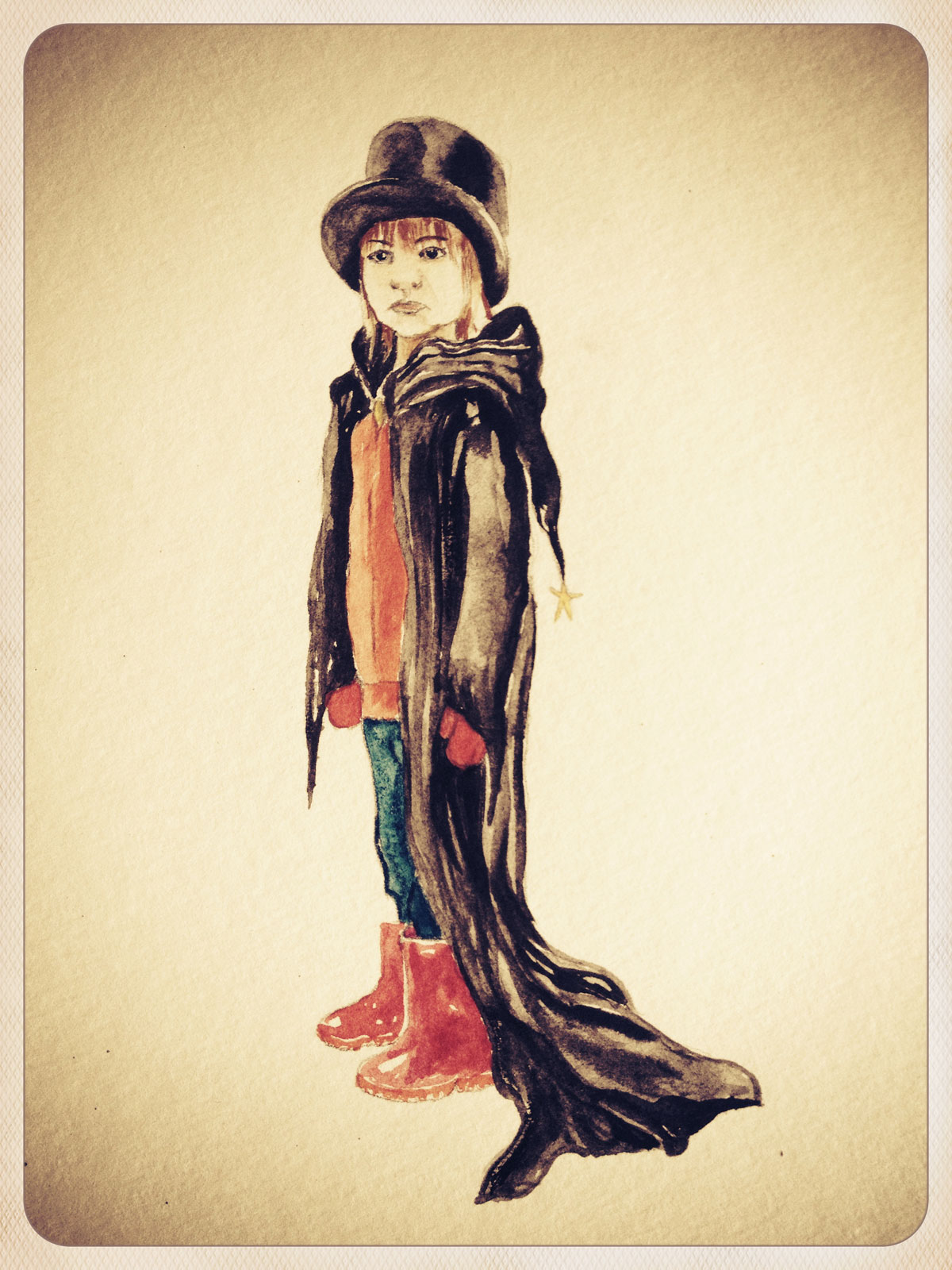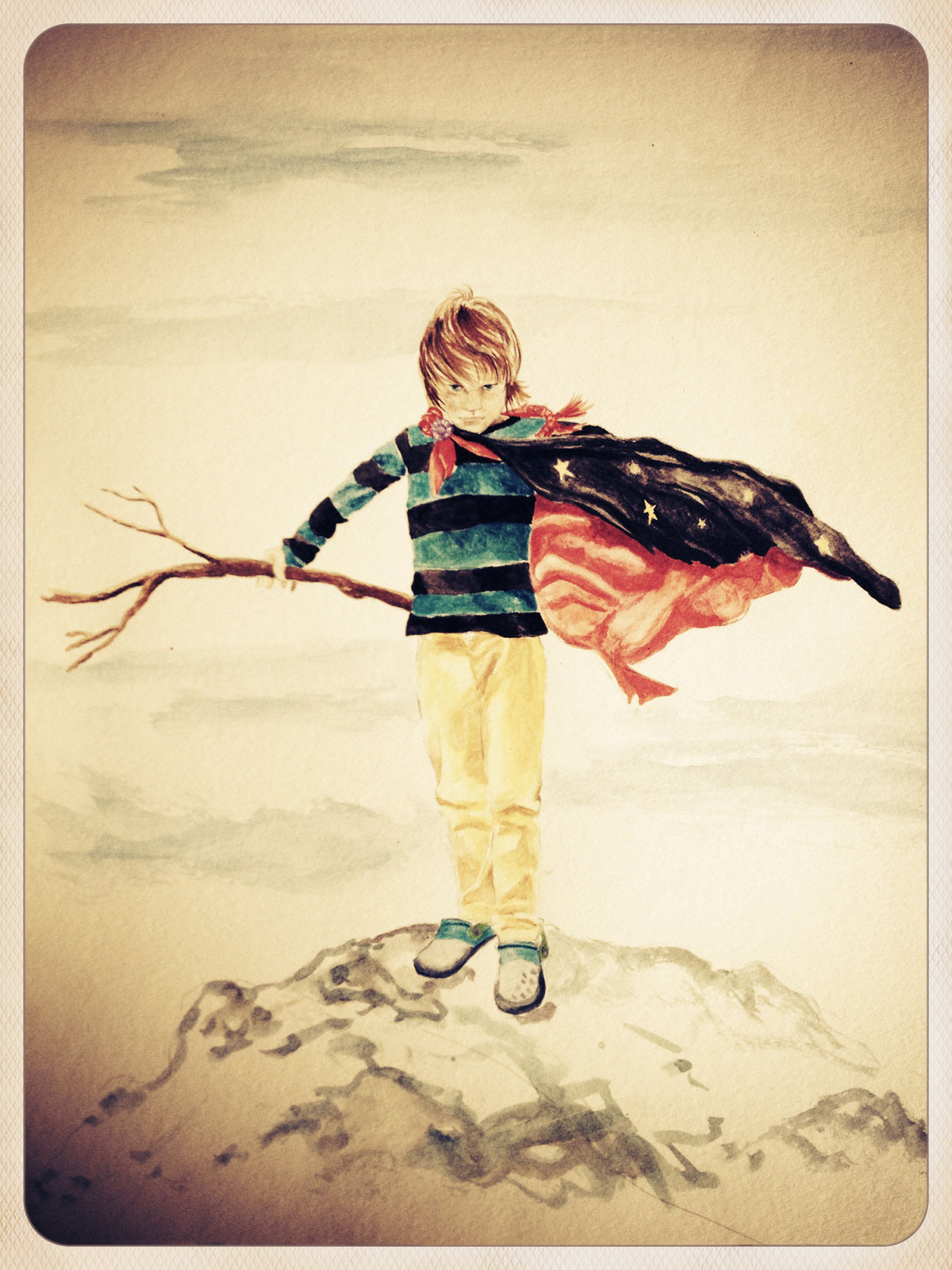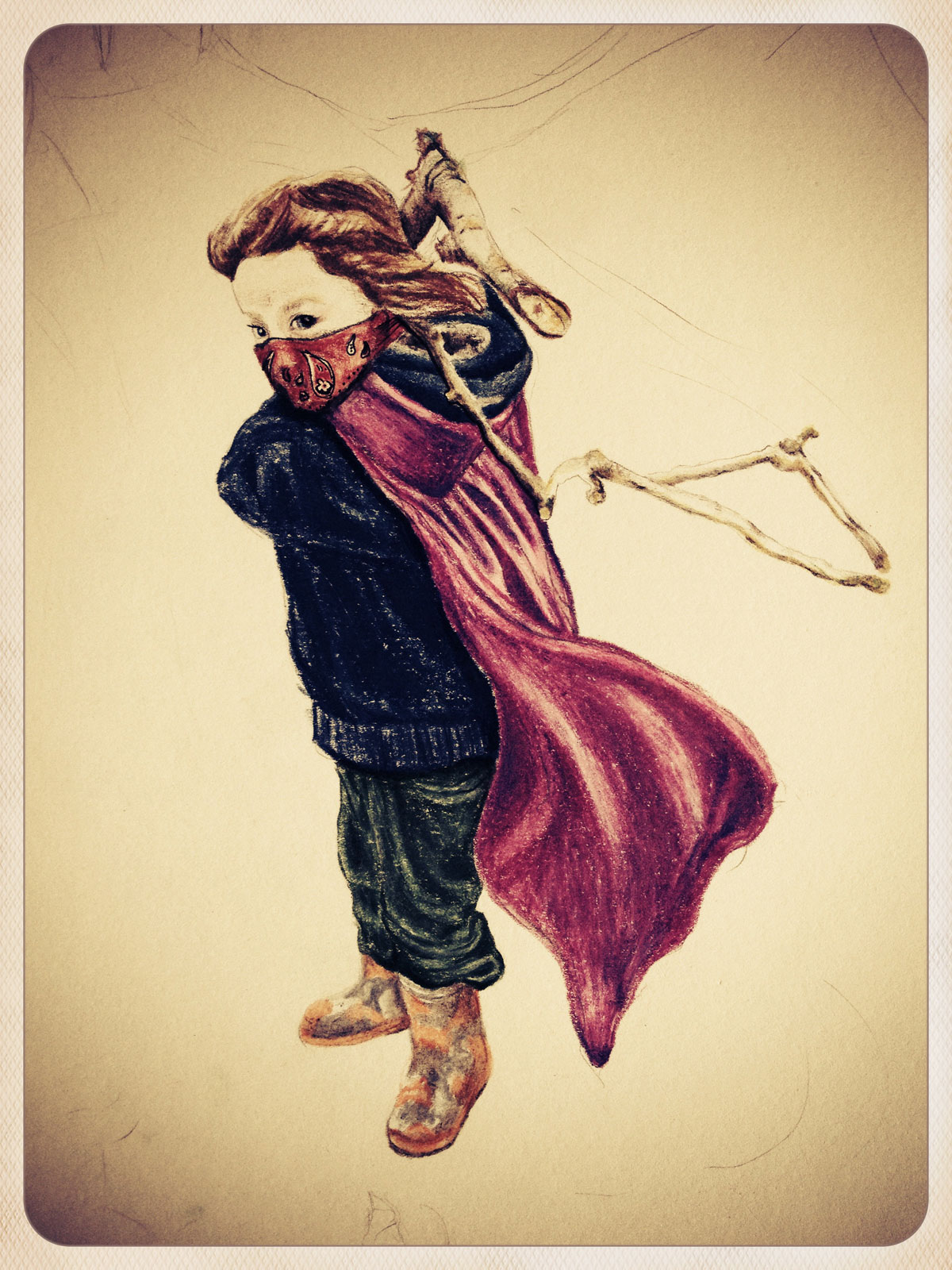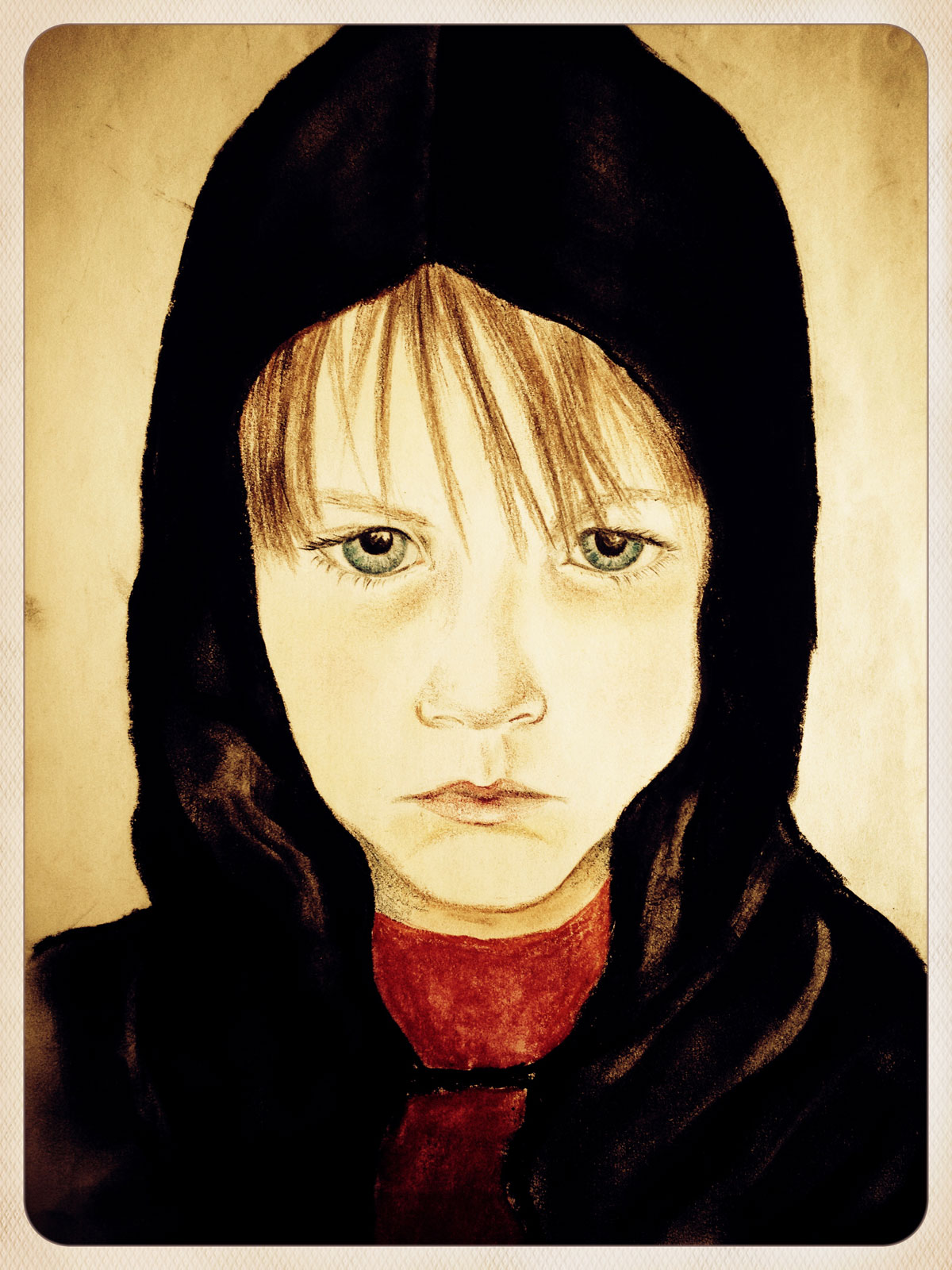ARTIST-IN-RESIDENCE
★ ★ ★ ★
DEE MULROONEY
We love artists at The Wild Word.
Our Artist-in-Residence page provides a space for artists to showcase their work and to spread their creative wings. In their month of residency, invited artists are encouraged to collaborate, to experiment and develop new projects, while giving us an insight into their creative process.
Our Growing Up issue Artist-in-Residence is Irish storyteller Dee Mulrooney.
‘The Boy with the Cape’
Peter wore capes.
All kinds of capes. Everyday.
King capes, warrior capes, vampire capes, grim reaper capes, wizard capes.
His Nana made them on her sewing machine.
Peters favourite cape was his Dark Lord cape.
Peter felt powerful wearing his capes.
He could fight ferocious beasts,
battle his arch enemy,
smite scary giants,
hide from the All-Seeing Eye.
One day Peter felt worried.
He needed to whisper his worry in Mammy’s ear.
He was starting school in a few weeks and capes were not allowed.
Mammy hugged Peter in her arms and told him “a problem shared is a problem halved”
She said she had a plan.
Later that day Peter, Mammy and Séimí, Peter’s older brother went to their favourite beach. They collected shells and watched the sunset just as Peter’s granddad and great granddad did before him. Mammy told them stories from the mouth as the autumn harvest moon rose over the horizon. She said that they were there to gather moonbeams and secrets from their ancestors.
Peter wondered did his granddads stand in the exact spot he was standing in.
They had buckets and Mammy showed them how to carefully collect the moonbeams from the silver-tipped waves gently lapping on the shore.
Mammy said moonbeams were very powerful and protective, they worked with all the mammies everywhere, they moved the oceans, they wrapped themselves around the earth with their silvery light, shimmering love and memory, they helped babies come into the world and they helped old souls leave.
Peter gathered lots of moonbeams in his bucket, but when he wanted to show them to Mammy they were gone. She said, not to worry, that they were still there but became invisible when taken from the sea.
Three weeks passed and it was time for Peter’s first day at school. Mammy, Daddy and Séimí were all there too waiting in line for the teachers. Peter felt nervous and wanted to cry. Then it was time to go inside to his new classroom. Mammy bent down and held his shoulders gently, she looked him in the eyes “Don’t forget your new cape sweetheart”.
Peter’s heart jumped and skipped a beat, he had forgotten!
Quickly he opened his schoolbag and Mammy helped him put on his most magnificent cape, his Invisible Moonbeam Cape.
EPILOGUE
My son, Peter’s passion for capes started when he was just one and a half years old, and it has stayed with him ever since. The original Dracula cape he wore then, had to be stealthily removed during his infant slumbers to be washed on rare occasions, such was his commitment to that mass-produced Tesco special.
What started out as cute sometimes became a hindrance especially as his collection grew and he needed the exact right cape depending on the occasion. I could also see how Peter used the capes as a device to create a distance between him and the “real world”, intuitively this never bothered or worried me as long as he was comfortable. I could see how behind his shy exterior, his capes made him feel more confident in social situations. I spent many hours watching him in his caped persona, immersing himself fully in whatever battle or adventure was going on in his imagination.
When it came to starting school I really worried about how he would react to life in a strange situation without his capes. Months in advance I started to plant the seed of the invisible cape and its powers. I also talked about how mammies are magically attached to their children by invisible umbilical cords no matter where they are. This might sound a little creepy and Freudian to some but for a little fella with no problem declaring his love for his Mammy, morning, noon and night I thought it was a helpful psychological device to deal with the separation of school.
Never one to go with the flow, I’ve always found it difficult how we nonchalantly accept separation from our little ones for such long periods of the day. We’ve a pathological obsession in first-world societies with separating babies and children from their mothers and it begins at birth, with every possible interference in this most sacred of relationships. We are terrified of our children not being independent, perhaps subconsciously we project from an early age what is required to live in this treadmill society we’ve created. The now overused English quote “Keep calm and carry on” comes to mind.
Peter is now eight and the capes are less and less of a feature in his life, a natural transition from being a little boy to a big one I guess. For a while they came with us in his pocket “just in case” as he would say. I noticed how the once powerful device had become unsafe in certain social settings, he was growing up and becoming more self-conscious. I found this profoundly moving and life-affirming and I shed more than a tear.
Peter is still a shy boy and he has developed a rich inner life as a result, he can play happily for hours by himself, and is in no hurry to have a best friend.
As a chronic extrovert and “over-sharer” I’m learning a lot from my Boy with the Cape. Our personas and masks come in all shapes and sizes.
Dee Mulrooney
Dee Mulrooney's reading of 'Maggie's Doll'
ON STORYTELLING
A very clear and happy childhood memory is of my Dad’s Auntie May visiting our house and telling me stories. She had a way of describing ordinary life in a rich extraordinary way.
As a child I often remember being told “not to be so nosey” I asked people so many questions about themselves. I guess I’ve always had a curiosity about details and indeed I still find ordinary people’s lives somehow fascinating.
As I grow into my middle years I have a sense of urgency to “collect” the details of my parents lives, especially their childhoods. These details have somehow transformed into stories, scribbled into existence in transient moments on the S-bahn, writing themselves with no effort on my part. They are like ghosts to me, they make me feel connected to my ancestors, they’ve helped me heal some sad tales and for that I love them.
Maggie’s Doll is a story that arose from various conversations I’ve had with my mother about her childhood. A lot of the details in the story are historical correct and the content is based on anecdotes. Lizzy refers to my mother’s biological mother who passed away when she was just five months old.

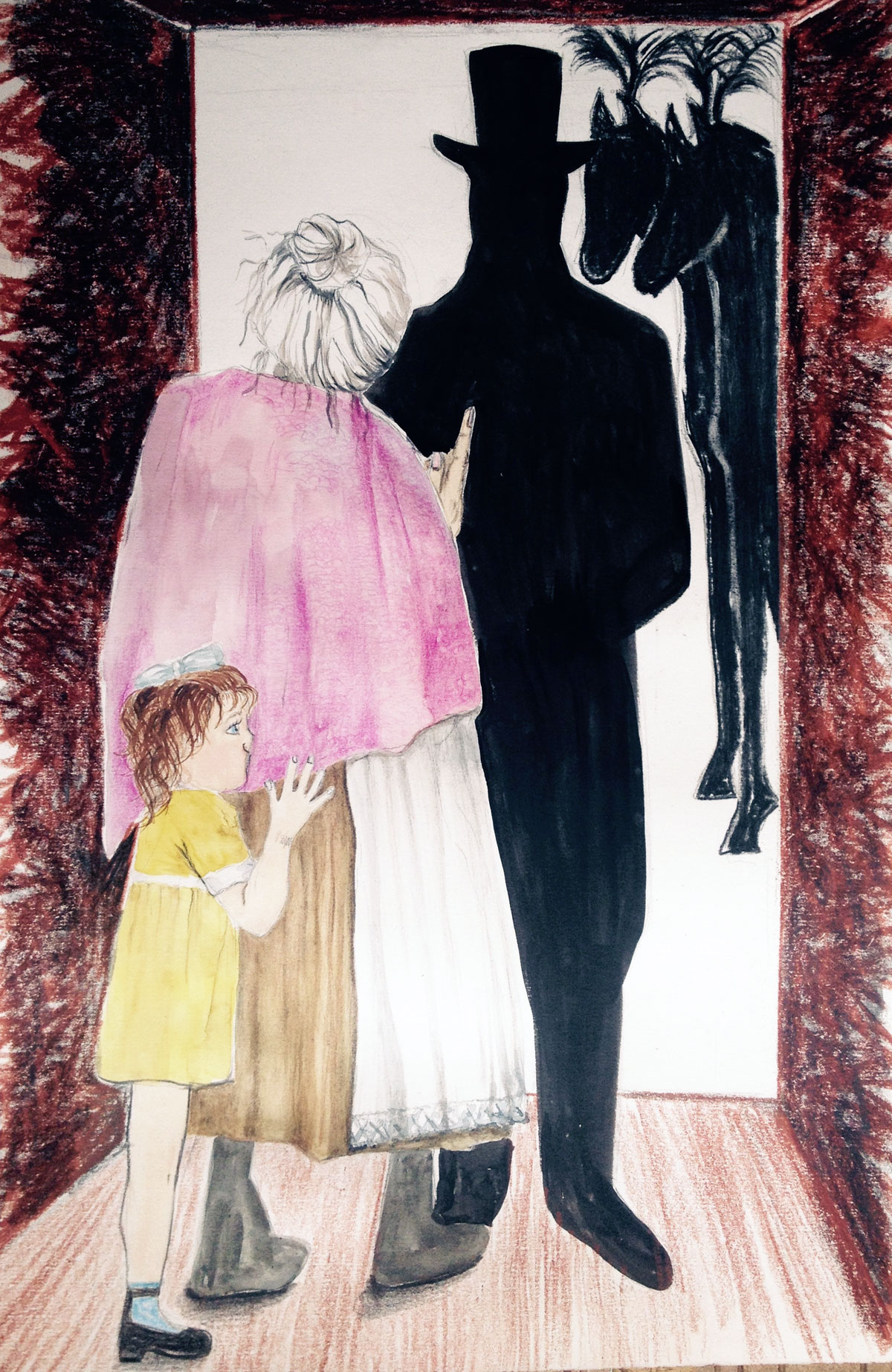
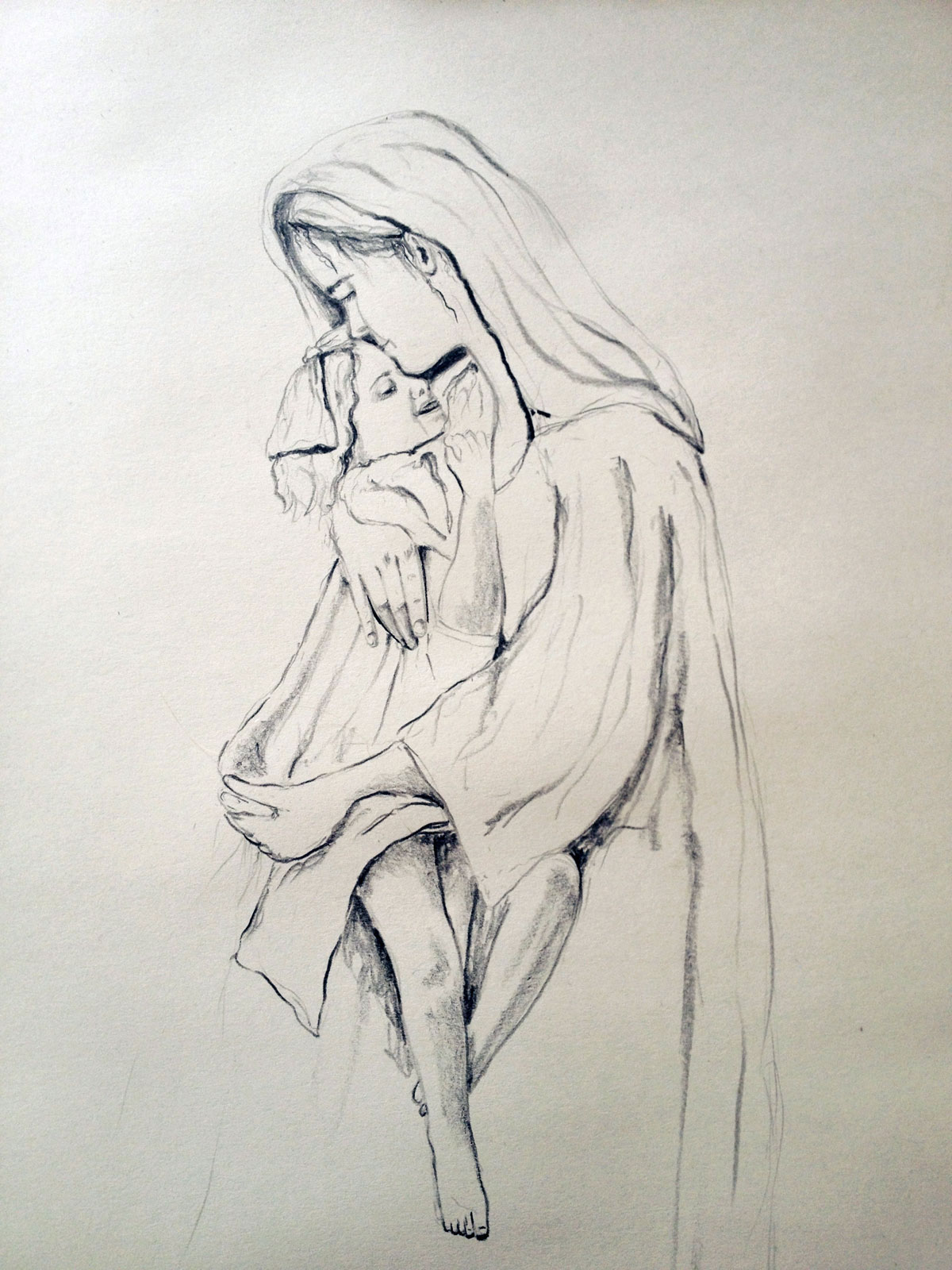
‘MAGGIE’S DOLL’
Maggie was worried. She didn’t know why but she had always felt that way.
She was seven years old, she had a Mammy, a house and sometimes they had enough food.
She loved school and she was a good girl.
One day a big surprise happened. Uncle Billy who lived in London came to visit with his friend Séan.
Uncle Billy was Maggie’s favourite person. He was very handsome and always wore beautiful suits with a pink handkerchief in the breast pocket.
He had kind brown eyes and the warmest smile.
The best thing about Uncle Billy was that he loved spending time with Maggie. She would sit for hours listening to his stories of adventures in London.
Uncle Billy always brought Maggie presents, only she didn’t really care about them as they would always disappear when he left.
As Uncle Billy and Seán opened the little iron garden gate to Maggie’s house, Mrs. Long, Maggie’s mother groaned and blessed herself. ‘Oh Jesus, Mary and Holy Saint Joseph, here comes that “moff” and his friend.’ She was never pleased to see him.
Maggie didn’t understand why as Billy always brought cakes, tea and presents for everyone.
Mrs. Long talked about being mortified whenever Uncle Billy came.
Maggie didn’t know what mortified meant or what a “moff” was. She asked her older sister Betty but she told Maggie to be quiet and not to be so nosey. Maggie didn’t care what anyone thought, she loved Uncle Billy and that was that.
She ran to the door to meet him and Séan. On seeing her, Billy picked her up and swung her around high in the air.
Now, Maggie had a daddy but she only saw him once. He wore a long black coat with tails and a tall black hat. He drove a horse and carriage with four big black horses. They had huge feather plumes attached to their heads—even the feathers were black.
Mrs. Long said that he was an undertaker. Maggie was afraid of him. Mrs. Long wasn’t. Once she told him that “over her dead body” would he ever take Maggie. Maggie felt safe behind Mrs. Long’s apron.
Uncle Billy and Séan took Maggie by the hand and went into the house. Mrs. Long greeted them and forced a smile. Uncle Billy gave her a big straw basket full of fancy foods, things that Maggie only saw when he came to visit.
There was marmalade, tea from India, satin pillow sweets, shortcake biscuits. There were even oranges! Maggie only ever had oranges when Santa came.
Then came Maggie’s present. Billy handed her a big beautiful box with lots of flowers printed on it. It was tied closed with a huge red satin bow.
Maggie looked at Mrs. Long and she looked back with a softness in her eyes that Maggie rarely saw.
‘Go on sweetheart, open it,’ she said.
The box was so beautiful and the bow so perfect that Maggie almost didn’t want to open it. Very slowly she pulled on the bow, her heart racing with excitement.
She lifted the lid and inside she saw the most beautiful doll. She had long black curly hair, green eyes and she was wearing a bright red coat. She had a rosebud mouth and a soft pale round face.
Maggie fell in love with her immediately. As she picked her up from her box Mrs. Long said, ‘you’ll have to give her a name’. The softness was still in her eyes.
Maggie knew as soon as she laid eyes on her what her name was.
‘I’m going to call her Lizzy,’ she said. This was Maggie’s favourite name.
Uncle Billy and Séan stayed until it got dark, Maggie heard lots of stories and ate so much shortcake that she had pains in her belly.
She was so happy that she forgot about being worried until the moment came to say goodbye, and then she felt a sinking feeling go right from her belly to her toes. Her heart started to race and she couldn’t move her feet. Saying goodbye this time to Uncle Billy was the hardest. She held on tight to his neck. He smelled like flowers and had the softest skin. He told Maggie not to worry that Lizzy would take care of her, that she was Maggie’s special doll.
Uncle Billy left and Maggie thought her heart would break, she wished she could go with him and Seán. Maggie wished that she would always have enough food, that there would be coal for the fire, that Mrs. Long would keep the soft look in her eye. More than anything though, she wished that she could keep Lizzy.
Maggie went to bed and said her prayers before falling asleep. She prayed with all her heart that when she woke up in the morning, Lizzy would still be where she left her in her flower box beside her bed.
That night Maggie dreamed sweet dreams. She dreamt that she could fly and that she was floating amongst the clouds.
She saw Lizzy in her dream but she was no longer a doll, instead she was a beautiful young woman. Her red coat had become a red cloak.
She had a look in her eyes that Maggie recognised, something old but familiar awoke in Maggie’s heart—she felt such love for this woman. She ran to her and Lizzy wrapped her in her cloak and hugged her.
She whispered something in Maggie’s ear, she stroked her hair and cupped Maggie’s small face in her gentle hands. She looked deeply with her bright green eyes into Maggie’s eyes and told her that she was never alone.
Lizzy told her that she knew her before she was born, she knew her in the warm safe darkness of memory. Maggie didn’t really understand the words that Lizzy was saying but she understood the love she felt for this woman through every part of her body.
She could feel and hear things she couldn’t while she was awake. She could hear the steady thump of her own heart and Lizzy’s heart, she could hear and feel the blood rushing through her veins and Lizzy’s. She felt her heart melt into Lizzy’s, she felt their blood mix until they became one. Maggie no longer felt her body, she was free, she was floating, she was swimming in love.
Then she heard the words:
‘I know you, I am always with you, I belong to you.’
Maggie woke up early the next day. Her normally colourless room seemed brighter than usual and she had a warm, light feeling in her tummy.
Slowly, the memory of her dream came back to her. Then she thought of Lizzy.
She decided not to look beside her bed just yet, instead she closed her eyes and saw Lizzy clearly in her mind.
‘I know you, I am always with you, I belong to you,’ Maggie repeated these words to herself a few times.
Then it was time to take a look. With one eye closed and the other squinting, Maggie peeked beside her bed.
There was Lizzy, lying in her box exactly where Maggie left her. She picked her up and tucked her tightly into bed beside her.
Maggie heard Mrs. Long’s footsteps coming up the stairs. For a moment she thought about hiding Lizzy but she knew that the doll could be sold to old Mr. Hemptenstall for quite a bit. Mrs. Long needed the money to buy medicine for Maeve, Maggie’s much older sister.
So, Maggie gave Lizzy one last kiss and placed her back in her beautiful box.
The bedroom door opened. Maggie quickly turned over and pretended to be asleep.
She tried to hold her breath so Mrs. Long wouldn’t hear her sobs. She just wanted it to be over, she thought she might die from not breathing and the pain she felt in her heart but she didn’t want Mrs. Long to feel bad, so she held on.
Then she heard something unexpected, she heard Lizzie’s box being opened and a soft rustle followed by a gentle weight on her bed. Mrs. Long left the room.
Maggie let out a long sad cry and gasped to catch her breath.
She turned around to see where Lizzy had been and she couldn’t believe her eyes.
Right next to her in bed was Lizzy, looking right at her with her big green sparkly eyes.
Attached to her red coat with a small brass pin was a piece of ribbon with the words ‘I belong to Maggie’ sewn onto it.
The End
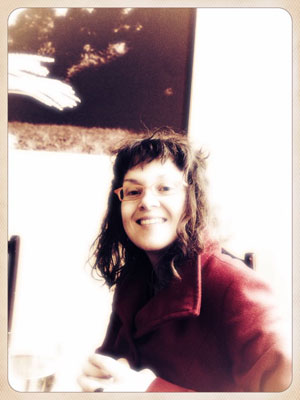
Dee Mulrooney is a teacher, a doula and a story teller. Her recent transition to Berlin has created unexpected space for her own creativity. As a teacher of over fifteen years Dee has been facilitating other people’s creative endeavors. She is constantly inspired and stimulated by human relationships, engagement and connection. Berlin is fertile ground for her passion for storytelling as an art form, and her love for illustration and children’s books continues to grow and develop.



